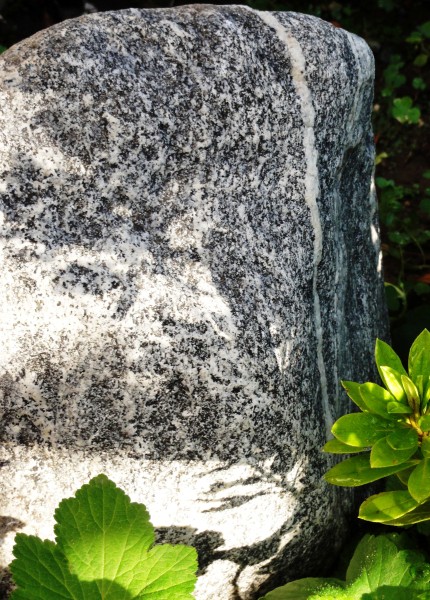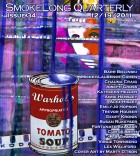I pulled the truck off the road and onto the narrow shoulder where the path to the cabin started. For a good-bye weekend before my year away, Colleen and I had driven out to my dad’s parcel of country land, a mix of wetland marsh and long, narrow hills of glacial drift. While I pulled out our backpacks, I told her about the hills, that they’re called drumlins.
“It would be even hillier here,” I said, “but the farmers flattened a lot of it out.”
The dark soil was frozen in clumpy rows and mostly covered with thatch and patchy snow. “The field looks like Frosted Wheat,” she said. To her, nothing was what it seemed on the surface—dreams swirled with augury, curled autumn leaves reminded her of shells, a bat that got trapped in her apartment meant someone was in trouble.
I had met Colleen two years before when she started coming into the cafe where I worked. The first time she walked up to the counter, I recognized her as the ticket-woman from the discount movie theater near campus, a woman I had only seen behind glass. Her face and neck and arms were patterned with freckles I admired as she passed me a ticket. She took a sweeping look at the cafe’s cracked, black and white tile floor, the dusty counter, the sagging ceiling. She smiled and said, “This place is a dump.”
I asked her out every time she came in for weeks after that. She would turn me down with the same smile, a smile that equally invited and dismissed. She would say, “No, college boy.” “No thanks, I don’t go out with soda jerks.” “No. But you can sit with me for a minute.'”
The first time we kissed, we were sitting in a booth at the cafe as huge snowflakes floated down outside the six-foot windows and the Egyptian guys that always hung out in the afternoon sang in Arabic. I slipped into the booth next to Colleen, a break from bussing tables, and asked if I could read what she was writing. With a hand on her notebook she said I had a better chance of seeing her naked than reading an unfinished poem. I imagined her naked—her whole, smooth body flecked with brown like rusty feldspar in granite and I felt like someone had tipped the entire booth toward the wall. When she pulled her lips from mine she didn’t back her face away. “You shouldn’t have done that,” she whispered while the Egyptian guys laughed and whistled.
On the path, Colleen’s red backpack bobbed in front of me, the field to our left beyond a single line of poplars, to our right a tangle of briar and bare young elms. At each little jog were fieldstones that my dad piled into cairns, often balancing the rocks precariously, or circling them with barbed wire he found or filling in cracks with bits of old glass. He spent hours out there on the weekends and sometimes during the week after teaching, alone with his trees and his rocks. He appreciated the rocks for their solid presence, the way their age dwarfed his own, the way they told him to slow down. My love for geology came from him.
Colleen stopped to look at a cairn where the path veered to the right to avoid a shallow spring. In a sort of nest my dad must have made out of braided vines a pile of smooth fieldstones were heaped into a mound like fossilized eggs.
Colleen said, “He spent so much time on these. All my dad ever stacked were beer cans. I wish he had a place like this.” And I wished selfishly that we could look at beauty together without the automatic suggestion of sadness. I had never left someone that didn’t want me to go. I pointed at the fieldstones and said that for all the different kinds in the pile not a single one of them originated here.
“They were all dragged here by the glaciers, those red ones full of iron from the Upper Peninsula, sandstone from near Grand Ledge, even the gravel and dirt are from the North. The only naturally occurring rock around here is shale, and it’s way down below all the drift.”
Colleen didn’t respond right away. She usually doesn’t anymore when I talk about rocks. Rocks are on the shit list. Rocks are a cold quiet reminder that I’m leaving. I was invited, along with two other geology students, to spend a year’s internship in the Argentine Andes, helping our department chair with fieldwork and I can’t wait to see the folded earth, the faults that the mountains rose through. But with Colleen, even Argentina itself has come under fire from association. “Argentina,” she says. “He’s leaving me for Argentina,” the woman’s name hanging in the air like exhaled smoke.
She surprised me and pointed at a fist-sized piece of dark basalt with the toe of her boot. Granitic crystals ribboned the middle of the stone.
“What’s that?”
“That’s a xenolith,” I said, glad that I knew. “It’s a rock fragment that flowed into an older rock and cooled there and hardened.” She nodded. As I heard my own words I was sure she was thinking ‘that’s like us,’ and maybe it is, my atoms slowing at the point of contact, forming structure, crystallizing.
I said, “Let’s get to the cabin. We’ll dump our stuff and make some coffee.”
“That’s what we’ll do,” she said quietly, her skinny voice a mix of sadness and doomed bravery. The woods behind her were still, and even winter-stark, so thick that almost no grey sky leaked through.



 The core workshop of SmokeLong Fitness is all in writing, so you can take part from anywhere at anytime. We are excited about creating a supportive, consistent and structured environment for flash writers to work on their craft in a community. We are thrilled and proud to say that our workshop participants have won, placed, or been listed in every major flash competition. Community works.
The core workshop of SmokeLong Fitness is all in writing, so you can take part from anywhere at anytime. We are excited about creating a supportive, consistent and structured environment for flash writers to work on their craft in a community. We are thrilled and proud to say that our workshop participants have won, placed, or been listed in every major flash competition. Community works.